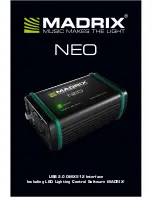
User's Guide HDSP System Multiface II
© RME
73
30.4 AES/EBU - SPDIF
The most important electrical properties of 'AES' and 'SPDIF' can be seen in the table below.
AES/EBU is the professional balanced connection using XLR plugs. The standard is being set
by the
Audio Engineering Society
based on the AES3-1992. For the 'home user', SONY and
Philips have omitted the balanced connection and use either Phono plugs or optical cables
(TOSLINK). The format called S/P-DIF (SONY/Philips Digital Interface) is described by IEC
60958.
Type AES3-1992
IEC
60958
Connection
XLR
RCA / Optical
Mode Balanced
Un-balanced
Impedance
110 Ohm
75 Ohm
Level
0.2 V up to 5 Vss
0.2 V up to 0.5 Vss
Clock accuracy
not specified
I:
±
50ppm
II: 0,1%
III: Variable Pitch
Jitter
< 0.025 UI (4.4 ns @ 44.1 kHz)
not specified
Besides the electrical differences, both formats also have a slightly different setup. The two
formats are compatible in principle, because the audio information is stored in the same place in
the data stream. However, there are blocks of additional information, which are different for both
standards. In the table, the meaning of the first byte (#0) is shown for both formats. The first bit
already determines whether the following bits should be read as Professional or Consumer
information.
Byte Mode Bit
0
1
2
3
4
5
6
7
0 Pro P/C
Audio?
Emphasis
Locked
Sample
Freq.
0 Con P/C
Audio?
Copy
Emphasis
Mode
It becomes obvious that the meaning of the following bits differs quite substantially between the
two formats. If a device like a common DAT recorder only has an SPDIF input, it usually under-
stands only this format. In most cases, it will switch off when being fed Professional-coded data.
The table shows that a Professional-coded signal would lead to malfunctions for copy prohibi-
tion and emphasis, if being read as Consumer-coded data.
Nowadays many devices with SPDIF input can handle Professional subcode. Devices with
AES3 input almost always accept Consumer SPDIF (passive cable adapter necessary).
Summary of Contents for DSP Multiface
Page 5: ...User s Guide HDSP System Multiface II RME 5 User s Guide Multiface II General...
Page 42: ...42 User s Guide HDSP System Multiface II RME...
Page 43: ...User s Guide HDSP System Multiface II RME 43 User s Guide Multiface II TotalMix...
Page 45: ...User s Guide HDSP System Multiface II RME 45...
Page 67: ...User s Guide HDSP System Multiface II RME 67 User s Guide Multiface II Technical Reference...
Page 74: ...74 User s Guide HDSP System Multiface II RME 31 Diagrams 31 1 Block Diagram Multiface II...
Page 76: ...76 User s Guide HDSP System Multiface II RME...
Page 77: ...User s Guide HDSP System Multiface II RME 77 User s Guide Multiface II Miscellaneous...








































